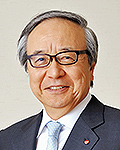Messages from Keidanren Executives and Contributed articles to Keidanren Journals August, 2015 The Globalization of Food: Japanese Food as a Universal Food of the Future

From May to October, this year's EXPO Milano 2015 is being held under the theme of "Feeding the Planet, Energy for Life." I would therefore like to take this opportunity to think for a moment about the "significance of food" and the "wholesomeness of Japanese food," which are perhaps things that we do not give much thought to in everyday life.
"You are what you eat."
This phrase is an old proverb in the United Kingdom. It is true that almost everything that humans eat is digested and broken down in the body into peptides and amino acids, which are then distributed around the body through the bloodstream. It goes without saying that food provides nutrition for life itself. Humans create "cell culture liquid" from the materials that are distributed through the body, and then use this liquid to renew the body's cells that are being continuously broken down, thus maintaining equilibrium in the body.
What is more, food is also the source of human evolution. The second revolution that humans achieved following the development of the power of speech was the means to engage in cooking (Charles Darwin). Once humans started using fire to cook, the energy they required to digest food was reduced, enabling our bodies to evolve into their current form, including our large brains and the formation of our jaws, teeth and internal organs, which ultimately resulted in the formation of human society as we know it today (Richard Wrangham). In recent years we have been able to extend life through nutrition and medical care, and we are continuing along our evolutionary path to the future.
Food is also memory. We retain a massive amount of food-related information in our brains based on our own experiences, referring to this vast databank each time we eat and making decisions and selections about what to eat or what not to eat based on such factors as safety, deliciousness and personal preference. These decisions and selections link married couples, families, friends, people and countries together.
Food also has a political aspect. Although the world continues to move toward free trade mechanisms, at the same time lack of food or dissatisfaction or inequality concerning food can lead to terrorism, violence and even revolution.
In today's world, disparities between malnutrition in developing countries and over-nutrition in industrialized countries are continuing to grow. Japanese food and cuisine offers a partial yet important solution to such nutritional problems. With its optimal use of diverse ingredients to create an ideal nutritional balance, Japanese food is in fact at the cutting edge globally when viewed from the perspectives of health and longevity. The food culture of the Japanese people could be adjusted to local tastes and play a key role in the advancement of food culture globally, making a contribution to delicious food and worldwide health and longevity.
If a regional food culture that possesses "universal truth" becomes a common preference for humanity, it will spread around the world.
"Tell me what you eat. I can tell you what you are."
These words were spoken by Jean Anthelme Brillat-Savarin, a Frenchman who authored "The Physiology of Taste." Interest, knowledge, understanding and enjoyment of delicious food is something that is the same in any country, and it helps to create happy and peaceful people.
As we look to the 2020 Tokyo Olympic and Paralympic Games and beyond, I think it can be said that we have a golden opportunity to further spread Japanese cuisine to the four corners of the globe. I hope that as a nation we can think once again about the wide-ranging role food plays in our lives, and seek to make the daily diet of the Japanese people something that is enjoyed as a universal food of the future and contributes to global health.
